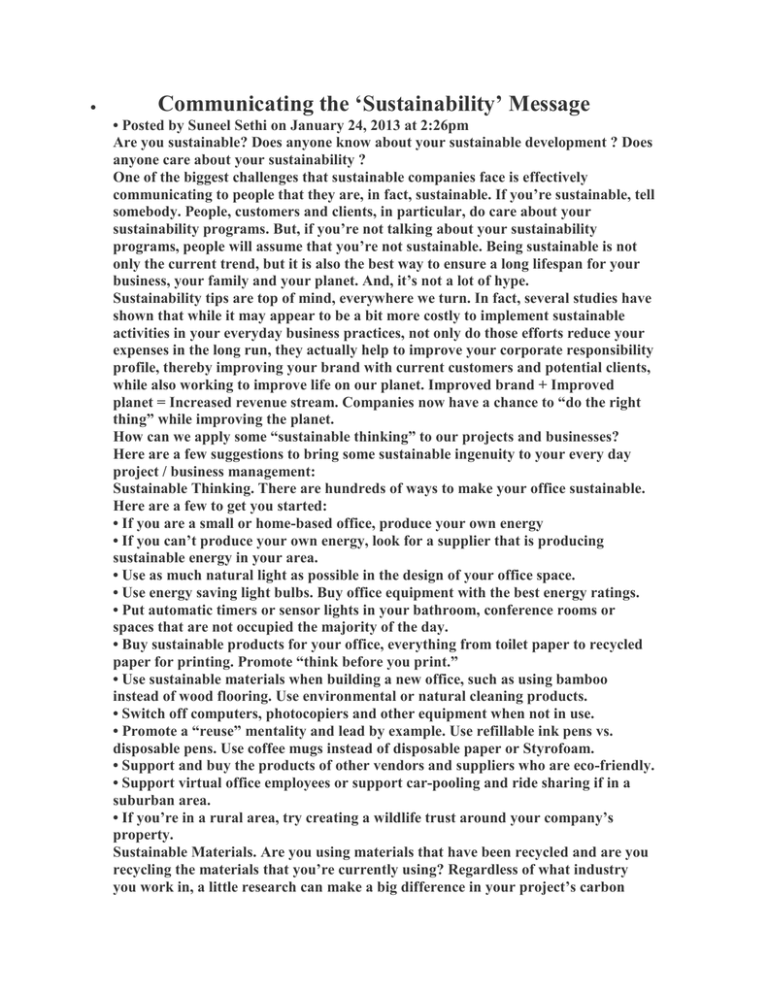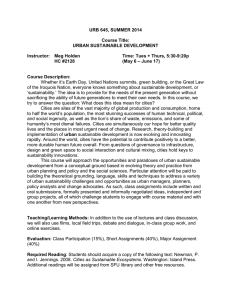Communicating the ‘Sustainability’ Message
advertisement

Communicating the ‘Sustainability’ Message • Posted by Suneel Sethi on January 24, 2013 at 2:26pm Are you sustainable? Does anyone know about your sustainable development ? Does anyone care about your sustainability ? One of the biggest challenges that sustainable companies face is effectively communicating to people that they are, in fact, sustainable. If you’re sustainable, tell somebody. People, customers and clients, in particular, do care about your sustainability programs. But, if you’re not talking about your sustainability programs, people will assume that you’re not sustainable. Being sustainable is not only the current trend, but it is also the best way to ensure a long lifespan for your business, your family and your planet. And, it’s not a lot of hype. Sustainability tips are top of mind, everywhere we turn. In fact, several studies have shown that while it may appear to be a bit more costly to implement sustainable activities in your everyday business practices, not only do those efforts reduce your expenses in the long run, they actually help to improve your corporate responsibility profile, thereby improving your brand with current customers and potential clients, while also working to improve life on our planet. Improved brand + Improved planet = Increased revenue stream. Companies now have a chance to “do the right thing” while improving the planet. How can we apply some “sustainable thinking” to our projects and businesses? Here are a few suggestions to bring some sustainable ingenuity to your every day project / business management: Sustainable Thinking. There are hundreds of ways to make your office sustainable. Here are a few to get you started: • If you are a small or home-based office, produce your own energy • If you can’t produce your own energy, look for a supplier that is producing sustainable energy in your area. • Use as much natural light as possible in the design of your office space. • Use energy saving light bulbs. Buy office equipment with the best energy ratings. • Put automatic timers or sensor lights in your bathroom, conference rooms or spaces that are not occupied the majority of the day. • Buy sustainable products for your office, everything from toilet paper to recycled paper for printing. Promote “think before you print.” • Use sustainable materials when building a new office, such as using bamboo instead of wood flooring. Use environmental or natural cleaning products. • Switch off computers, photocopiers and other equipment when not in use. • Promote a “reuse” mentality and lead by example. Use refillable ink pens vs. disposable pens. Use coffee mugs instead of disposable paper or Styrofoam. • Support and buy the products of other vendors and suppliers who are eco-friendly. • Support virtual office employees or support car-pooling and ride sharing if in a suburban area. • If you’re in a rural area, try creating a wildlife trust around your company’s property. Sustainable Materials. Are you using materials that have been recycled and are you recycling the materials that you’re currently using? Regardless of what industry you work in, a little research can make a big difference in your project’s carbon footprint. Sustainable Packing. Packing materials for products can produce a lot of waste. Can you use recycled materials for packing, such as old newspapers? Consider biodegradable packing peanuts and environmentally friendly soft foam. Commitment to Sustainability. When you make sustainability more than a passing fancy, you show your team and your customers that you mean business. You’re not just being trendy; you’re making changes that impact the world around you. Publicizing Sustainability. There’s already a lot of bad news out there. Your customers want to hear about the good things that you’re doing. So, if you have a sustainable initiative or a project with a sustainable heart and soul, talk about it. Get the buzz going. Publicizing sustainable business practices are only bad when you are insincere. When it comes to achieving sustainable development or saving the planet, who better to lead the charge than large corporations, companies and established business houses? Who knows better than them about tackling something large with small milestones that make a big difference? Several large and small businesses are concerned that if they identify their sustainable practices, consumers will then fault them for other business practices that are not yet sustainable. Don’t worry! By demonstrating your commitment to moving the needle, to reducing your carbon footprint, to reducing your contributions to non-biodegradable waste, etc., your customers will applaud and appreciate your efforts. They may even start singing your praises and become your advocates. And, who is better for customer retention and acquisition than excited and satisfied existing clients – no one. It can be easy being sustainable. Just bring a Sustainability Officer on board to get it done. So how do you tell the world that you are sustainable? The answer is simple – track your efforts, their impact and then tell somebody. Without tracking and measurement, all communication is just hot air. As you track your efforts, tell people. Tell your employees, tell your friends, tell your family members – and tell them through all forms of media, on line, in person, via email, on the phone, over drinks, at dinner, brochures, blogs, websites, you name it. Don’t be shy. This is good news! You’d be surprised how much traction a basic message can achieve when there are measurable actions that make a difference. Your message and your business will become viral before you know it. Make your sustainability message plain and simple. Say it always and often. Incorporate your sustainable messages into your everyday business practices so that you and your employees know what you’re doing, why you’re doing it and how you are making a difference, in your business, your personal life and the lives of all and everyone that your business impacts





